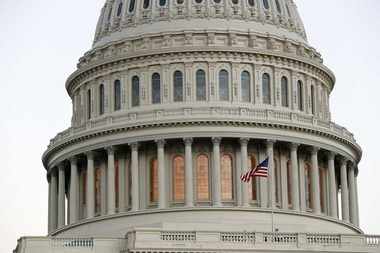A traditional end to an unconventional presidential election

WASHINGTON (AP) — The end of the 2016 presidential election is at hand, though House Democrats don't plan to let it pass quietly.
A joint session of Congress is set to count the Electoral College votes on Friday, a traditional ending to a most unconventional presidential election.
Several House Democrats plan to raise objections during the count. They could slow the process, but they don't have the votes to prevent Donald Trump from winning.
Rep. Sheila Jackson Lee, D-Texas, is leading the effort to object to Trump's election. She and other House Democrats want to draw more attention to American intelligence findings that Russia worked to sway the election in Trump's favor.
"The American people are owed an explanation," Jackson Lee said. "It's a very important part of American democracy that we have free fair elections."
Lee also complained that Republicans in some states suppressed voter turnout, either by purging voter rolls before the election or by enacting strict voter ID laws.
Under federal law, if at least one senator and one House member object to the vote from any state, the House and Senate would meet separately to debate the merits of the objection.
Lee said several House Democrats are expected to raise objections, but no senator has publicly backed the idea. Regardless, with Republicans controlling both chambers, any objection would have little chance of affecting the outcome.
House Democratic Leader Nancy Pelosi said she isn't encouraging people to object. But, she added, "I will be there and I will support those who object."
On Friday morning, Trump went on Twitter to provide another assessment of the election.
"Hillary and the Dems were never going to beat the PASSION of my voters. They saw what was happening in the last two weeks before the (election) and knew they were in big trouble — which is why they cancelled their big fireworks at the last minute. THEY SAW A MOVEMENT LIKE NEVER BEFORE," Trump wrote.
All 538 electors met in their respective state capitals in December to cast their votes. Trump finished with 304 votes and Democrat Hillary Clinton with 227, according to a tally by The Associated Press. It takes 270 Electoral College votes to win the presidency.
Trump won even though Clinton received nearly 2.9 million more votes. His election has generated much angst among Democrats and others who oppose the billionaire businessman. But they have been powerless to change the outcome.
Despite rumblings of a revolt, only two Republican electors — both from Texas — cast protest votes for someone other than Trump. Clinton lost four Democratic electors in Washington state and one in Hawaii.
___
Associated Press writer Mary Clare Jalonick contributed to this report.
___
Follow Stephen Ohlemacher on Twitter at: http://twitter.com/stephenatap
By STEPHEN OHLEMACHER, Associated Press
Copyright Associated Press. All rights reserved.
The Gayly - 1/6/2017 @ 11:36 a.m. CST.





